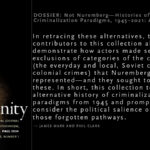The Western myth of Nuremberg has dominated understandings of the evolution of international criminal law. Enshrining the International Military Tribunal as a critical point of origin, this paradigm has developed a narrative of post-war liberal progress, in which a universal model of externally-delivered, individualised criminal justice was interrupted by the exigencies of the Cold War then rediscovered through various international and hybrid tribunals in the 1990s and early 2000s, culminating in the creation of the International Criminal Court in 2002. Often instrumentalised to protect Western Continue reading → Continue reading →
This article offers a history of drones grounded in the British use of aerial control in the Middle East and Afghanistan before World War II, rather than in the history of technology. Such a history promises a better understanding of the drone strategy’s likelihood of success because it shows how history, memory, and politics have shaped both the use of aerial control and its reception. Specific cultural and political assumptions first underwrote the invention of aerial control in the Middle East and continue to guide the use of drones in the region today. Our focus on remote piloting as the most controversial aspect of drone use has distracted us from these critical continuities with earlier uses of air power. Continue reading →


 'Choose Your Bearing: Édouard Glissant, Human Rights and Decolonial Ethics' is now available for pre-order!
'Choose Your Bearing: Édouard Glissant, Human Rights and Decolonial Ethics' is now available for pre-order!  Grab your copy and save 30% OFF using the code NEW30 at checkout :
Grab your copy and save 30% OFF using the code NEW30 at checkout :